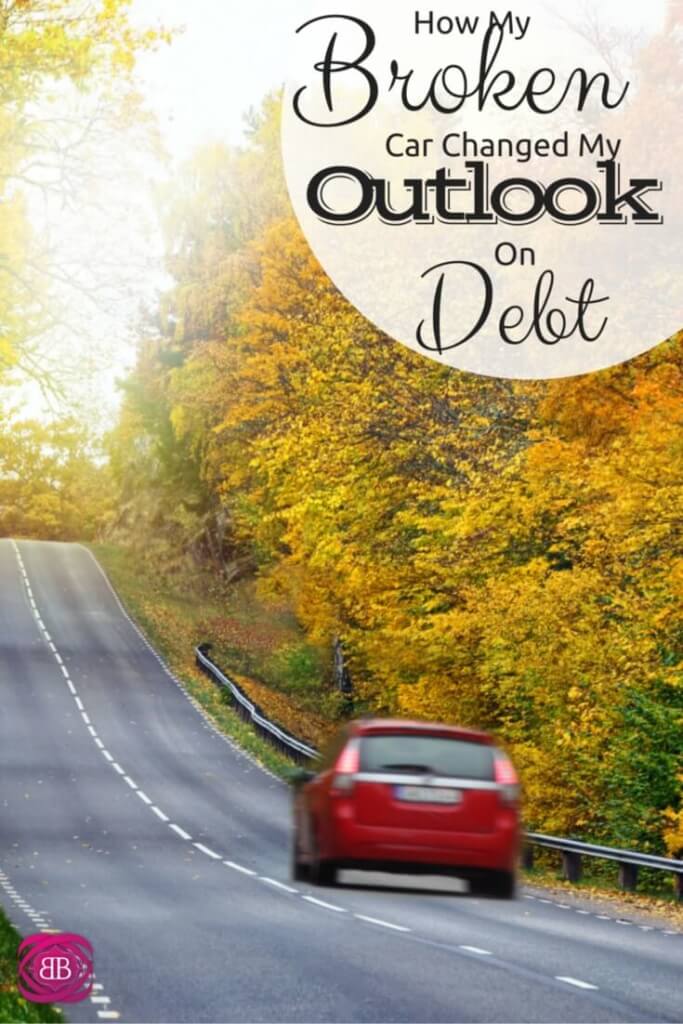Today’s post is written by my friend and fellow PF blogger, Aaron Crowe. Once you’re finished reading it, please hop on over to his blog as I am posting over there today. 🙂 Enjoy!
I don’t think anyone consciously chooses a life of debt. It just sort of happens. A new clothing purchase here. Dining out. Buying more car or home than you can afford. Before you know it, you’re in debt.
After graduating from college, the financial freedom I thought I was getting from a new credit card quickly turned into a sinkhole. That’s not devastating news. Many grads face the same problem with credit cards, using them for bar trips, vacations and other expenses they can’t afford.
I eventually put those small but frequent purchases on hold and changed my lifestyle for about a year. But what really got me into debt, and made me reconsider ever carrying a credit card balance again, was when I used my credit card to pay for a major car repair.
That debt of about $2,000 was enough to make me change my spending and saving habits for life.
Here’s What Happened:
I was two years out of college and my used Mazda GLC’s brakes were squealing badly. I took it to Midas, where the mechanics found other problems that made the car too dangerous to drive if they weren’t fixed.
When the repairs were made and the bill arrived, I had already figured I’d have to put it on my credit card. But when the clerk tried to run my credit card, it was denied because my low credit limit had already been reached.
I called the credit card company from the Midas shop, and Discover graciously and easily increased my credit limit. I made the payment and left with my car. I never knew how easy it would be to get more credit on the spot.
When the next credit card bill arrived, I quickly figured out that it would take me years of paying the principal and interest before the full amount was paid off — and that was if I didn’t use the credit card for any other purchases. My debt would probably last longer than my car would.
That thought immediately scared me enough to reconsider how I used my credit card, and to save for an emergency fund for broken cars and other mishaps in the future that were bound to happen.
It was difficult on my low salary, but I stopped using the credit card and cut back on my social life spending for about a year so I could pay the credit card balance in full within a year.
The Solution: An Emergency Fund
I slowly started saving for an emergency fund. And when I say slowly, I mean as slow as you can save — $25 a month in a direct deposit from my checking account to a savings account. A year or so later, I increased that amount.
In the years since then, I’ve occasionally been in debt to a credit card company. By my definition, that means paying less than the full amount due in a month and paying interest. I don’t like paying interest if I don’t have to, so I pay the bills in full each month. If that can’t be done, then I either cut back expenses or try to earn more money somehow.
Saving in an emergency fund helps, and I try to make the monthly transfers painful enough that I see it and feel it when I look at my checkbook.
Debt can have its purposes. For example, student loans and a home can be worthwhile to use debt to pay for — as long as the loans are being paid off at a reasonable rate.
But going into debt for emergencies or everyday purchases is something I’d rather avoid. Emergencies are a part of life — from a car crash to a hospital stay or leaking roof — and not having at least a majority of the cost set aside can leave you paying interest for a basic need.
If I couldn’t afford to keep a car running, then maybe I shouldn’t have a car, I realized. So if I wanted to keep my car, I had better start saving for the expenses that go with it. It’s a life lesson I still try to follow today, and it changed my outlook on debt.
What changed your outlook on debt?
Aaron Crowe is a freelance journalist who specializes in personal finance writing for a variety of websites, including his own at Add-Vodka.com, CashSmarter.com and BeforeYouInvest.com. Follow him on Twitter at @AaronCrowe.
Also don’t forget to hop on over to Add-Vodka to see my financial tips for new moms. Thanks Aaron for stopping by!















I totally agree that if you can’t afford for a car maintenance then why should you buy a car? I really don’t understand why some people still get a car even if they know that they are not financially capable.
Exactly how are you getting to work if you don’t have transportation? What a silly comment.
Aaron is a full time freelance writer so he works from home. 🙂
The thing which changed my outlook on debt was when I finally reached the point where even making my minimum debt repayments became a struggle. Until then, debt repayment was always something that wasn’t a priority for me. It was something I would do “tomorrow”.
When the funds started to bite, however, I had to accept the depressing truth. And I got started with my repayments rapidly, with the goal of becoming debt free as soon as possible.
Now I have achieved that, I wonder how I let the problem run on for so long. I could kick my younger self 😉
Great post! Ahh, the emergency fund; took me a while to learn about it and put it in place, but it’s one of the most important aspects of my financial plan. If I can only get more folks to buy into the idea.
I’m not sure anything specific ever changed my outlook on debt. Always hated it and avoided it. Borrowed for our last car, and it was definitely the right decision (esp now it’s paid off) – but it definitely cemented my hatred of having financial obligation.
Having an emergency and not having the emergency fund or even a credit card to pay for it, was an eye-opening experience for me and my husband. We resolved to do everything in our power to get out of debt. We’re doing our best to pay off debt and build up an emergency fund now. It’s slow-going, but we’re working on it.
Love your story. Paying off my car and dealing with unexpected repairs has also helped change my view of debt. I realize that having some emergency savings is responsible and the best way to prepare for the unexpected. I like how you started setting aside something even though it wasn’t much. That’s where I’m at currently. Consistently saving a little money can grow over time and saving something is better than saving nothing.
Congratulations on paying off debt. My parents taught me that debt was evil so I never had a different outlook on it.
I love how you mentioned, “not having at least a majority of the cost set aside can leave you paying interest for a basic need.” Who wants to pay interest on basic needs? A mortgage, understandable. But car repairs, no one wants to pay interest on that. An emergency fund definitely helps with these type of expenses. We have an emergency fund and a car maintenance fund so we don’t have to empty our emergency fund if something happens to our car.
That experience of yours really changed your outlook on debt. This just proves that experience is really the best learning we can have. Glad that your car broke. LOL
Being broke as a joke changed my outlook on student loans — the “good debt”. Now I despise all debt.
“Good debt”, now there’s an oxymoron if I ever saw one.
I guess I’m lucky in that I was raised to be frugal. But I definitely had to take things even more seriously when I got engaged to my husband. He was in a bunch of debt, and we ended up having to get him $12,000 of oral surgery.
I started a home based business in 1985. In 1988 I made my first, and thankfully only, seriously bad business decision – I moved it to a strip mall. Then came the stock market crash in 1989. By 1990 we were personally bankrupt and the business could not continue without major changes. I defaulted on my lease, made an arrangement to pay them, let my employees go and moved it back home. I sold it in 2008 for close to mid-six figures.
In the meantime though, we were in a horrifying financial situation. We consulted our attorney who explained that the bankruptcy laws were written for this type of situation. We consulted with our financial planner who said the same thing. The only problem? I had made commitments to my creditors when I purchased their products and services and I refused to walk away from that commitment.
After canceling all non-necessities like cable and the newspaper, and cutting out coupons every Sunday, we went on the envelope system. At this time my husband had a job with a “guaranteed” paycheck. We had two children ages 7 and 4. I had a box of envelopes and wrote things like groceries, gas, utilities, credit cards, entertainment, etc. on each one.
When my husband got paid (our mortgage, taxes and insurance were on auto pay), he cashed his check and I put $X amount of dollars in each envelope. I filled the necessity envelopes like utilities and gas to get to work first and groceries and entertainment last. If we ran out of food a few days before getting paid again, we ate rice and beans. I always put $10 in the entertainment envelope because I firmly believed that the only way this was going to work was if we got to do something fun beside the free fun things I could find. We usually took the kids to a pizza or hamburger place and to an afternoon movie. The business was profitable again but any money it brought in went to debt repayment.
We lived like that for two years until all the debt was paid off and we didn’t owe anything except our mortgage. It wasn’t easy and I answered a lot of “Why can’t I have those jeans, everyone else has them?” and “Why do we always go clothes shopping at Goodwill?” It was hard, but it brought us together as a family and we still remember the good times. We’ve never been in debt like that again.